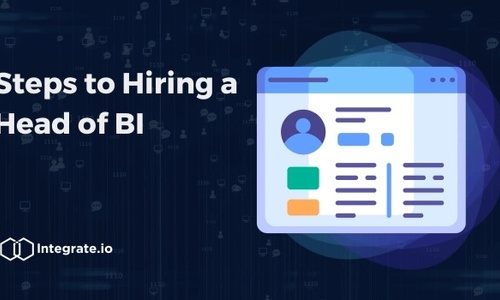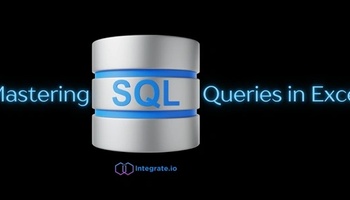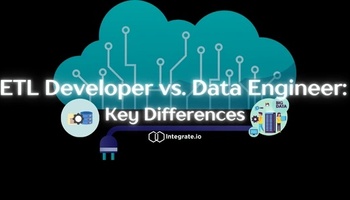The Head of Business Intelligence (BI) oversees the use of software for data analytics and decision-making. Finding the right person for this role is critical because it's likely a key part of your business's broader BI implementation and team-building strategy.
Here are 5 tips for finding the right Head of BI:
- Write a concise Head of BI job description with the help of managers and IT professionals within your organization.
- Turn the job description into an ad that attracts the right candidates to post on job search sites and on your company's website.
- Look for a Head of BI with experience in your industry and ask for proof of results from their previous successes.
- Ensure that the Head of BI matches your corporate culture, as this can affect how your business behaves.
- Consider experience using popular business intelligence tools, but more importantly, you'll want to hire a Head of BI with a general understanding of processes.
This article provides a step-by-step guide to help companies hire the right Head of Business Intelligence (BI).
Table of Contents
- Step 1: Write a concise Job Description
- Step 2: Post on Job Search Sites & on Company Website
- Step 3: Choose a Head of BI With Experience in Your Industry
- Step 4: Ensure Your Head of BI Matches Your Corporate Culture
What does a head of business intelligence do?
Many companies struggle to hire the right Head of Business Intelligence (BI) because human resources (HR) and hiring managers don’t know what tasks the position fulfills. If you don't want to start the hiring process from that disadvantage, you'll first need to learn more about the position and how to focus on the perfect candidates.
A Head of Business Intelligence is a senior-level executive responsible for overseeing the development, implementation, and management of business intelligence strategies and initiatives within an organization. Their primary role is to harness the power of data and analytics to drive informed decision-making, improve operational efficiency, and gain a competitive edge in the market.
To initiate the hiring process on the right track and ensure you attract suitable candidates, the first step is to craft a compelling job description for the Head of Business Intelligence position. Here are four steps to help you hire the right candidate for this role:
Step 1: Write a Head of Business Intelligence Job Description
A concise job description is essential for finding the best Head of Business Intelligence. Talk to managers and IT professionals within your organization, so you'll have the right information to write a BI job description.
What Skills Does a Good Head of BI Need?
Some of the skills you might include in your Head of BI job description include:
- Strong communication skills to help turn data into actionable plans.
- Knowledge of the latest industry trends and ability to make adjustments to keep up with changes.
- Problem-solving skills for finding innovative solutions to new issues.
- Capacity to evaluate huge amounts of information from a data warehouse.
- Leadership skills for decision-making that'll help get everyone to agree with new policies.
- Competence to manage a team of professionals.
The specific skills you include in your job description will depend on your company's needs. It's a good idea to always have managers evaluate job descriptions before you advertise the position. That way, you'll be sure to cover all bases.
What Traits Do You Want To See in Your Head of Business Intelligence?
Writing a good job description isn't easy, and a poorly written one can leave you with less-than-stellar choices for candidates. Instead, turn your Head of BI job description into an ad designed to attract the right candidates.
When you write the BI ad, include all of the mandatory and secondary skills that you want to see from applicants. Remember that you want to cast a wide net so you can pull in experienced pros. At the same time, you want to limit applications so you don’t waste time on unqualified people.
Step 2: Post Your Head of BI Ad on Job Search Sites
Once you have your ad listing, be sure to make it available on the internet and social media. You can post to popular job-search sites like:
If you know of any industry-specific sites, post your advertisement there. Don’t forget to add the open position request to your own company’s website as well.
What Tools Are Candidates Using To Make Business Strategy Decisions?
Your company may already use specific tools to gather and analyze data. If you do, then you'd look for a Head of Business Intelligence who has experience with those tools.
Some of the most popular business intelligence tools include:
- Chartio
- Sisense (formerly Periscope Data)
- Tableau Server
- Amazon QuickSight
Keep in mind that the top business tools will change over time. It’s more important to hire a Head of BI with a general understanding of processes than someone who has experience with a specific software suite.
Step 3: Choose a Head of Business Intelligence With Experience in Your Industry
Analytics strategies can change dramatically from one industry to the next. Therefore, you should look for a Head of BI who has experience working in your industry.
You don’t need to get too strict about this point. A candidate with e-commerce experience might not have the skills to work for a real estate company or healthcare business. That person probably knows more than enough about Salesforce to work for a large retail company, though.
Once a candidate reaches the interview phase, ask them how their past experiences will help them achieve goals within your company.
Related Reading: Whitepaper on Why Data Warehouses Are Critical for Ecommerce Businesses
Ask for Proof of Results
The best way to validate a candidate is by looking at their previous successes. How have their BI skills helped their previous employers or clients? What are their accomplishments? What were the outcomes of their recommendations and findings? Proof could be through an online portfolio or case studies. The more tangible results, the better.
References are also very important, so ask for at least three from the candidate's most recent positions in most cases. The more recent the position, the more useful references will be.
Discuss Recent Training and Professional Development
Business intelligence is an evolving field. There's always something new to learn and new regulations and technologies to implement. It’s crucial that you hire an expert who has recently received training and professional development in areas like big data, data visualization, predictive analytics, or reporting.
Consider candidates who have at least a bachelor's degree in business intelligence or other fields such as data science, business analytics, and similar. They may have held positions as data analysts, data engineers, and other related positions, where they may have used various programming languages such as SQL.
As organizations are forced to become more data-driven, it’s also a must that your organization retains BI pros who are constantly learning the latest techniques and trends in the field. Ideally, your candidate will regularly participate in professional development and have recently taken a training course.
Related Reading: Whitepaper on Integrate.io and Salesforce
Step 4: Ensure Your Head of BI Matches Your Corporate Culture
Company culture does much more than influence policies related to dress codes and employee benefits. It can also affect how your business behaves.
A company with an assertive culture might want to take more risks. In that case, you'd look for a Head of BI who likes aggressive policies. A company that moves ahead carefully might want to hire a Head of business information that spends a lot of time analyzing opportunities before pursuing them.
A candidate’s resume and cover letter may offer some insight into whether they will fit into the corporate culture. Once you reach the interview stage, you can ask more direct questions about their preferred policies.
Consider the Candidate’s Personality
Does your candidate have personality traits that are important for the role? Consider your needs before making any final decisions because personality is also a factor that should play into your decision. Will they be a team player? If they have trouble working with others, then you should definitely keep those factors in mind. Will this person mesh well with the rest of your team? If they won’t fit in nicely, then they won't provide the perfect fit for the role you need.
Long-Term Plans To Stay With Your Company
It can take months for a new Head of business information to become familiar with every project. Plus, a management or BI analyst can expect to earn a median income of $87,660 per year. The ones talented enough to take leadership positions make even more money.
Since your business will spend a great deal of time and money on the new Head of Business Intelligence, you must choose someone willing to grow with the industry. Anything less than five years will put you at risk of losing your investment in the employee.
Related Reading: Whitepaper on How to Hire the Right Head of BI
Make Business Intelligence Easier With Integrate.io
Your new Head of BI may have a lot of skills, but most Heads of BI need help with data integration. Give your employees the tools that they need to make data integration and data visualization easy.
Integrate.io can make business intelligence easier to develop. Our ETL platform integrates with nearly any data management system. It can extract, transform, and load your data into any system that you use to create high-quality visualizations. In short, it makes it easy to turn your raw data into refined business intelligence.
Schedule a demo to see how Integrate.io gives you the ability to create high-quality business intelligence.









